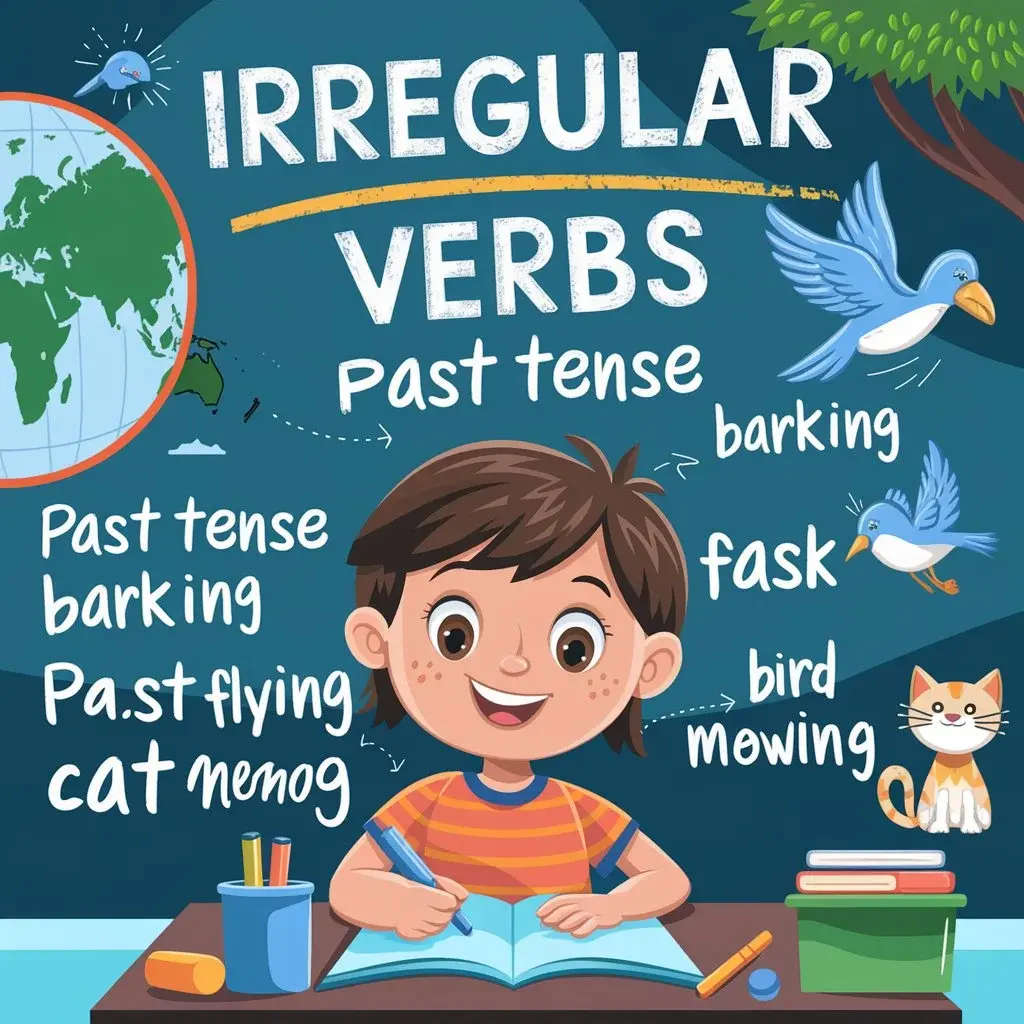Irregular verbs are an essential part of English grammar, often posing a challenge for learners due to their unique forms. Unlike regular verbs, which follow a predictable pattern by adding -ed for their past tense and past participle, irregular verbs do not adhere to this rule. Instead, they have their own distinct past tense and past participle forms that must be memorized.
This makes understanding and mastering these verbs crucial for effective communication. Consulting an irregular verbs list can simplify this process, providing a convenient reference for these exceptional verb forms. Whether you are a student or a language enthusiast, familiarizing yourself with these verbs will enhance your language proficiency and fluency.
Irregular Verbs List
Irregular verbs require memorization since their past tense and past participle forms deviate from the regular pattern. Below, you’ll find a tabular presentation of commonly used irregular verbs, making it convenient for quick reference.
| Base Form | Past Simple | Past Participle |
|---|---|---|
| arise | arose | arisen |
| be | was/were | been |
| bear | bore | borne/born |
| beat | beat | beaten |
| become | became | become |
| begin | began | begun |
| bend | bent | bent |
| bet | bet/betted | bet/betted |
| bite | bit | bitten |
| blow | blew | blown |
| break | broke | broken |
| bring | brought | brought |
| build | built | built |
| burst | burst | burst |
| buy | bought | bought |
| catch | caught | caught |
| choose | chose | chosen |
| come | came | come |
| cost | cost | cost |
| cut | cut | cut |
| deal | dealt | dealt |
| dig | dug | dug |
| do | did | done |
| draw | drew | drawn |
| dream | dreamt/dreamed | dreamt/dreamed |
| drink | drank | drunk |
| drive | drove | driven |
| eat | ate | eaten |
| fall | fell | fallen |
| feed | fed | fed |
| feel | felt | felt |
| fight | fought | fought |
| find | found | found |
| flee | fled | fled |
| fly | flew | flown |
| forbid | forbade | forbidden |
| forget | forgot | forgotten |
| forgive | forgave | forgiven |
| freeze | froze | frozen |
| get | got | got/gotten |
| give | gave | given |
| go | went | gone |
| grow | grew | grown |
| hang | hung | hung |
| have | had | had |
| hear | heard | heard |
| hide | hid | hidden |
| hit | hit | hit |
| hold | held | held |
| hurt | hurt | hurt |
| keep | kept | kept |
| kneel | knelt/kneeled | knelt/kneeled |
| know | knew | known |
| lay | laid | laid |
| lead | led | led |
| lean | leant/leaned | leant/leaned |
| leap | leapt/leaped | leapt/leaped |
| learn | learnt/learned | learnt/learned |
| leave | left | left |
| lend | lent | lent |
| let | let | let |
| lie | lay | lain |
| light | lit | lit |
| lose | lost | lost |
| make | made | made |
| mean | meant | meant |
| meet | met | met |
| pay | paid | paid |
| put | put | put |
| read | read | read |
| ride | rode | ridden |
| ring | rang | rung |
| rise | rose | risen |
| run | ran | run |
| say | said | said |
| see | saw | seen |
| seek | sought | sought |
| sell | sold | sold |
| send | sent | sent |
| set | set | set |
| shake | shook | shaken |
| shine | shone | shone |
| shoot | shot | shot |
| show | showed | shown/showed |
| shrink | shrank | shrunk |
| shut | shut | shut |
| sing | sang | sung |
| sink | sank | sunk |
| sit | sat | sat |
| sleep | slept | slept |
| slide | slid | slid |
| smell | smelt/smelled | smelt/smelled |
| speak | spoke | spoken |
| spell | spelt/spelled | spelt/spelled |
| spend | spent | spent |
| spill | spilt/spilled | spilt/spilled |
| spit | spat/spit | spat/spit |
| split | split | split |
| spread | spread | spread |
| spring | sprang | sprung |
| stand | stood | stood |
| steal | stole | stolen |
| stick | stuck | stuck |
| sting | stung | stung |
| stink | stank | stunk |
| strike | struck | struck/stricken |
| swear | swore | sworn |
| sweep | swept | swept |
| swim | swam | swum |
| swing | swung | swung |
| take | took | taken |
| teach | taught | taught |
| tear | tore | torn |
| tell | told | told |
| think | thought | thought |
| throw | threw | thrown |
| understand | understood | understood |
| wake | woke/waked | woken/waked |
| wear | wore | worn |
| weep | wept | wept |
| win | won | won |
| wind | wound | wound |
| withdraw | withdrew | withdrawn |
| withhold | withheld | withheld |
| withstand | withstood | withstood |
FAQs
What are irregular verbs?
Irregular verbs are verbs that do not follow the usual pattern of adding -ed to form their past tense and past participle. Instead, they have unique forms that must be learned individually. For example, the verb “go” becomes “went” in the past tense and “gone” in the past participle.
How do I use an irregular verbs list?
An irregular verbs list helps you remember the special past tense and past participle forms of verbs that don’t follow the regular pattern. By consulting this list, you can quickly find the correct forms for verbs like “see” (saw, seen) and “eat” (ate, eaten). It’s a handy tool for improving your grammar and writing skills.
Why is it important to learn irregular verbs?
Learning irregular verbs is important because they are commonly used in everyday conversation and writing. Mastering these verbs helps you speak and write correctly and fluently. Without knowing the correct forms, your communication might sound awkward or incorrect.
Are there many irregular verbs in English?
Yes, there are many irregular verbs in English, and they can vary in form and usage. While the list might seem long, focusing on the most commonly used verbs will make it easier to learn and remember them. Regular practice and use will help you become more familiar with these verbs.
How can I practice irregular verbs effectively?
To practice irregular verbs effectively, try using them in sentences and conversations. Repetition is key, so writing out the forms or using them in daily practice can help reinforce your memory. Additionally, engaging in grammar exercises and quizzes can make learning these verbs more interactive and enjoyable.
Final tips
In conclusion, mastering irregular verbs is a crucial aspect of achieving fluency in English. Although they present a challenge due to their unique forms, using an irregular verbs list can significantly simplify the learning process. By dedicating time to practice and familiarizing yourself with these verbs, you can enhance your communication skills and ensure that your writing and speaking are accurate and natural. Embrace the process, and with perseverance, you’ll find that handling these verbs becomes second nature.

I’m Clara Whitmore, the girl running the show at “Grammer Grove.” I’ve been playing with expressions and formats to make grammer a whole lot of fun. Over at Grammer grove, we’re here to make your English grammer incredible. Let’s add some professionalism and gratitude to yourwritting together!












